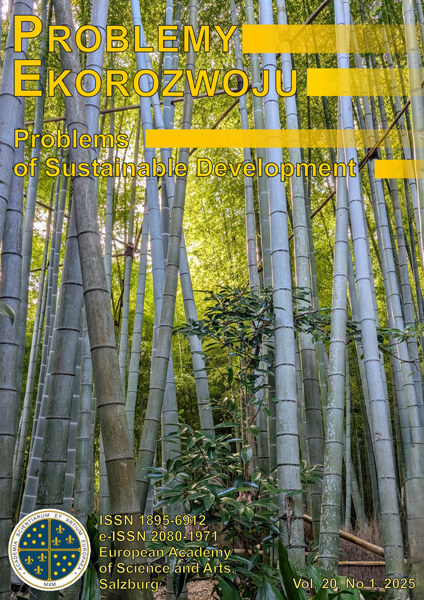Kraje Unii Europejskiej a ubóstwo, przed i po kryzysie COVID-19
Milan Marković
markovicmilan89@gmail.comUniversity of Niš, Innovation Centre of the University of Niš (Serbia)
Abstrakt
Celem artykułu jest ocena i przedstawienie pozycji krajów Unii Europejskiej według poziomu ubóstwa przed i po kryzysie COVID-19, łącząc pięć wskaźników indywidualnych. Do obliczenia złożonego wskaźnika ubóstwa wykorzystano metodę GRA (Grey Relational Analysis). Do oceny ubóstwa w badaniu wykorzystano kryteria z oficjalnej bazy Komisji Europejskiej oraz obliczono zagregowany wskaźnik dla lat 2019 i 2022. Wszystkie kryteria w modelu mają taką samą wagę względną, ponieważ zastosowano metodę równych współczynników wagowych. W artykule wykazano, że najkorzystniejsze wskaźniki ubóstwa w obu okresach posiadały Czechy i Słowenia, natomiast krytyczne miejsce zajmowała Grecja, Rumunia, Bułgaria i Łotwa. Ogólnie rzecz biorąc, kraje Europy Południowej i kraje bałtyckie mają słabe wskaźniki ubóstwa. W porównaniu do roku 2019, według rankingów krajowych, poziom ubóstwa jest znacząco wyższy w Finlandii, Niemczech i na Węgrzech, natomiast po pandemii znaczny postęp w ograniczaniu ubóstwa poczyniły kraje: Polska, Belgia, Luksemburg i Cypr. Zaprezentowane wyniki mogą być przydatne dla decydentów na poziomie makro w zakresie polityki gospodarczej, społecznej i zrównoważonego rozwoju.
Słowa kluczowe:
ubóstwo, zrównoważony rozwój społeczny, ranking wielokryterialny, wskaźnik złożony, pandemia, Unia EuropejskaBibliografia
ABIFARIN J., OFODU J., 2022, Modelling and grey relational multi-response optimization of chemical additives and engine parameters on performance efficiency of diesel engine, International Journal of Grey Systems, 2(1): 16-26, https://doi.org/10.52812/ijgs.33.
DOI: https://doi.org/10.52812/ijgs.33
Google Scholar
ALSHUWAIKHAT H.M., ADENLE Y.A., ALOTAISHAN T. N., 2023, The development of a grey relational analysis-based composite index for environmental sustainability assessment: Towards a net-zero emissions strategy in Saudi Ara-bia, Heliyon, 9(7): e18192. https://doi.org/10.1016/j.heliyon.2023.e18192.
DOI: https://doi.org/10.1016/j.heliyon.2023.e18192
Google Scholar
BÁRCENA-MARTÍN E., PÉREZ-MORENO S., RODRÍGUEZ-DÍAZ B., 2020, Rethinking multidimensional poverty through a multi-criteria analysis, Economic Modelling, 91: 313-325, https://doi.org/10.1016/j.econmod.2020.06.007.
DOI: https://doi.org/10.1016/j.econmod.2020.06.007
Google Scholar
BUHEJI M., DA COSTA CUNHA K., BEKA G., MAVRIC B., DE SOUZA Y.L., DA COSTA SILVA S.S., HANAFI M., YEIN T.C., 2020, The extent of covid-19 pandemic socio-economic impact on global poverty. a global inte-grative multidisciplinary review, American Journal of Economics, 10(4): 213-224, DOI: 10.5923/j.economics.20201004.02.
DOI: https://doi.org/10.5923/j.economics.20201004.02
Google Scholar
BURLINA C., RODRÍGUEZ-POSE A., 2024, Inequality, poverty, deprivation and the uneven spread of COVID-19 in Europe, Regional Studies, 58(2): 263-284, https://doi.org/10.1080/00343404.2023.2172390.
DOI: https://doi.org/10.1080/00343404.2023.2172390
Google Scholar
ĐOKIĆ M., 2022, World economy in the time of pandemic: Consequences of COVID-19 on world output, trade and employment, Economics of Sustainable Development, 6(1): 57-72, https://doi.org/10.5937/ESD2201057D.
DOI: https://doi.org/10.5937/ESD2201057D
Google Scholar
DRAGO C., 2021, The analysis and the measurement of poverty: An interval-based composite indicator approach, Econ-omies, 9(4): 145, https://doi.org/10.3390/economies9040145.
DOI: https://doi.org/10.3390/economies9040145
Google Scholar
EUROPEAN COMMISSION, 2024, Eurostat database, https://ec.europa.eu/eurostat/data/database (5.5.2024).
Google Scholar
GOEDEMÉ T., DECERF B., VAN DEN BOSCH K., 2022, A new poverty indicator for Europe: The extended head-count ratio, Journal of European social policy, 32(3): 287-301, https://doi.org/10.1177/09589287221080414.
DOI: https://doi.org/10.1177/09589287221080414
Google Scholar
HERMAN E., 2014, Working poverty in the European Union and its main determinants: An empirical analysis, Engineer-ing Economics, 25(4): 427-436, https://doi.org/10.5755/j01.ee.25.4.6339.
DOI: https://doi.org/10.5755/j01.ee.25.4.6339
Google Scholar
JOZIĆ S., BAJIĆ D., CELENT L., 2015, Application of compressed cold air cooling: achieving multiple performance characteristics in end milling process, Journal of Cleaner Production, 100: 325-332, https://doi.org/10.1016/j.jclepro.2015.03.095.
DOI: https://doi.org/10.1016/j.jclepro.2015.03.095
Google Scholar
KOVÁŘOVÁ E., 2023, The EU Countries’ Assessment with Respect to the Prevalence of Severe Material Deprivation and Determinants of Poverty: Application of Non-parametric DEA Approach, Revija za socijalnu politiku, 30(3): 271-291, https://doi.org/10.3935/rsp.v30i3.1840.
DOI: https://doi.org/10.3935/rsp.v30i3.1840
Google Scholar
KUO Y., YANG T., HUANG G.W., 2008, The use of grey relational analysis in solving multiple attribute decision-making problems, Computers & Industrial Engineering, 55(1): 80-93, https://doi.org/10.1016/j.cie.2007.12.002.
DOI: https://doi.org/10.1016/j.cie.2007.12.002
Google Scholar
ŁUCZAK A., KALINOWSKI S., 2020, Assessing the level of the material deprivation of European Union countries, Plos one, 15(9): e0238376, https://doi.org/10.1371/journal.pone.0238376.
DOI: https://doi.org/10.1371/journal.pone.0238376
Google Scholar
MARKOVIĆ M., POPOVIĆ Z., MARJANOVIĆ I., 2023, Towards a circular economy: evaluation of waste management performance in European Union countries, Serbian Journal of Management, 18(1): 45-57, https://doi.org/10.5937/sjm18-40073.
DOI: https://doi.org/10.5937/sjm18-40073
Google Scholar
MARKOVIĆ M., STANKOVIĆ J.J., DIGKOGLOU P., MARJANOVIĆ I., 2022, Evaluation of Social Protection Per-formance in EU Countries: Multiple-criteria Decision Analysis (MCDA), Problemy Ekorozwoju – Problems of Sustaina-ble Development, 17(2): 124-132, https://doi.org/10.35784/pe.2022.2.13.
DOI: https://doi.org/10.35784/pe.2022.2.13
Google Scholar
MENSHIKOV V., KOKINA I., KOMAROVA V., RUZA O., DANILEVIČA A., 2020, Measuring multidimensional poverty within the resource-based approach: a case study of Latgale region, Latvia, Entrepreneurship and Sustainability Issues, 8(2): 1211-1227, https://nbn-resolving.org/urn:nbn:de:0168-ssoar-88139-3.
DOI: https://doi.org/10.9770/jesi.2020.8.2(72)
Google Scholar
MICHÁLEK A., 2023, Changes in the social situation in EU countries during COVID‐19 (an alternative approach to the assessment of social indicators), Regional Science Policy & Practice, 15(8): 1841-1863, https://doi.org/10.1111/rsp3.12683.
DOI: https://doi.org/10.1111/rsp3.12683
Google Scholar
MISHRA N.P., DAS S.S., YADAV S., KHAN W., AFZAL M., ALARIFI A., KENAWY E.R., ANSARI M.T., HASNAIN M.S., NAYAK A.K., 2020, Global impacts of pre-and post-COVID-19 pandemic: Focus on socio-economic consequences, Sensors International, 1: 100042, https://doi.org/10.1016/j.sintl.2020.100042.
DOI: https://doi.org/10.1016/j.sintl.2020.100042
Google Scholar
ROCCHI L., RICCIOLINI E., MASSEI G., PAOLOTTI L., BOGGIA A., 2022, Towards the 2030 Agenda: measuring the progress of the European Union countries through the SDGs achievement index, Sustainability, 14(6): 3563, https://doi.org/10.3390/su14063563.
DOI: https://doi.org/10.3390/su14063563
Google Scholar
STANKOVIĆ J.J., DŽUNIĆ M., MARJANOVIĆ I., 2022, Towards an Inclusive Europe: Ranking European Countries Based on Social Sustainability Indicators, In International Conference on Decision Support System Technology, Cham, Springer International Publishing: 84-96.
DOI: https://doi.org/10.1007/978-3-031-06530-9_7
Google Scholar
WORLD HEALTH ORGANIZATION, 2023, https://www.who.int/director-general/speeches/detail/who-director-general-dr-tedros-end-of-2023-message--keeping-the-hope-for-health-alive (10.5.2024).
Google Scholar
UNITED NATIONS DEVELOPMENT PROGRAMME, 2024, Goal 1 – No poverty, https://www.undp.org/sustainable-development-goals/no-poverty (10.5.2024).
Google Scholar
YAMAOKA Y., ISUMI A., DOI S., OCHI M., FUJIWARA T., 2021, Differential effects of multiple dimensions of poverty on child behavioral problems: results from the A-CHILD study, International Journal of Environmental Research and Public Health, 18(22): 11821, https://doi.org/10.3390/ijerph182211821.
DOI: https://doi.org/10.3390/ijerph182211821
Google Scholar
ZINS S., 2020, Variance Estimation by Linearisation for the At Risk of Poverty or Social Exclusion (AROPE) Rate, Aus-trian Journal of Statistics, 49(1): 33-44, http://dx.doi.org/10.17713/ajs.v49i1.882.
DOI: https://doi.org/10.17713/ajs.v49i1.882
Google Scholar
Autorzy
Milan Markovićmarkovicmilan89@gmail.com
University of Niš, Innovation Centre of the University of Niš Serbia
Statystyki
Abstract views: 462PDF downloads: 264










